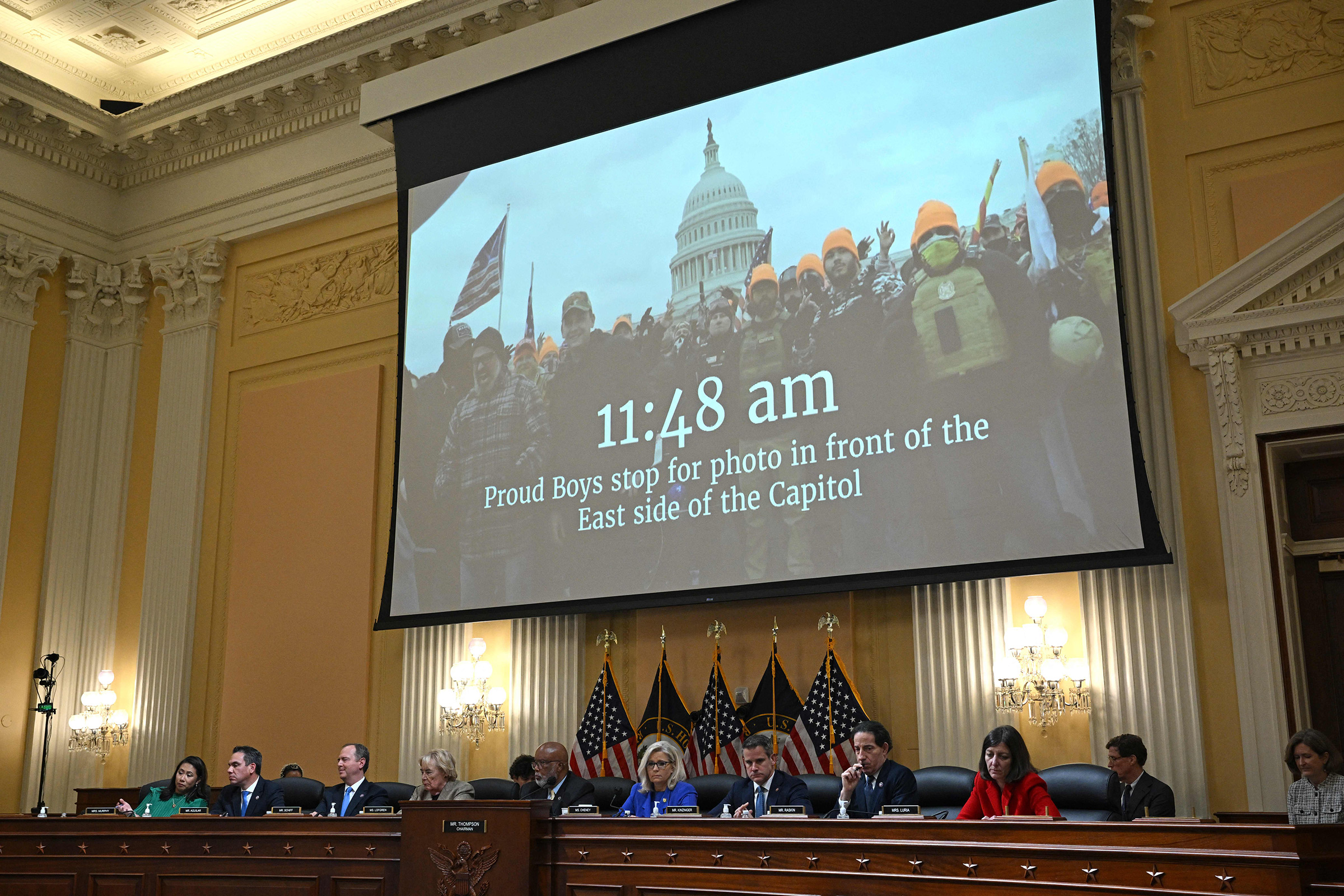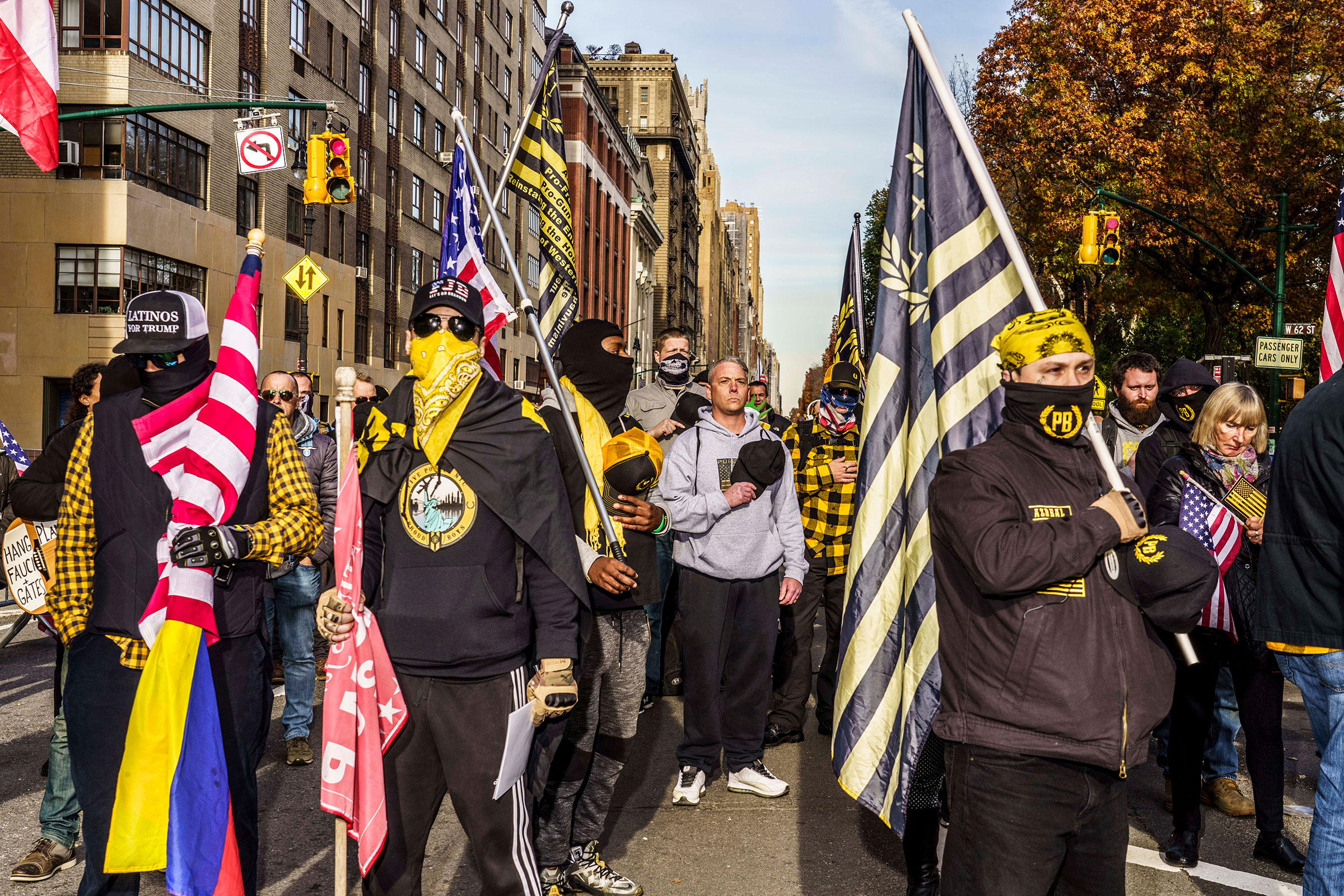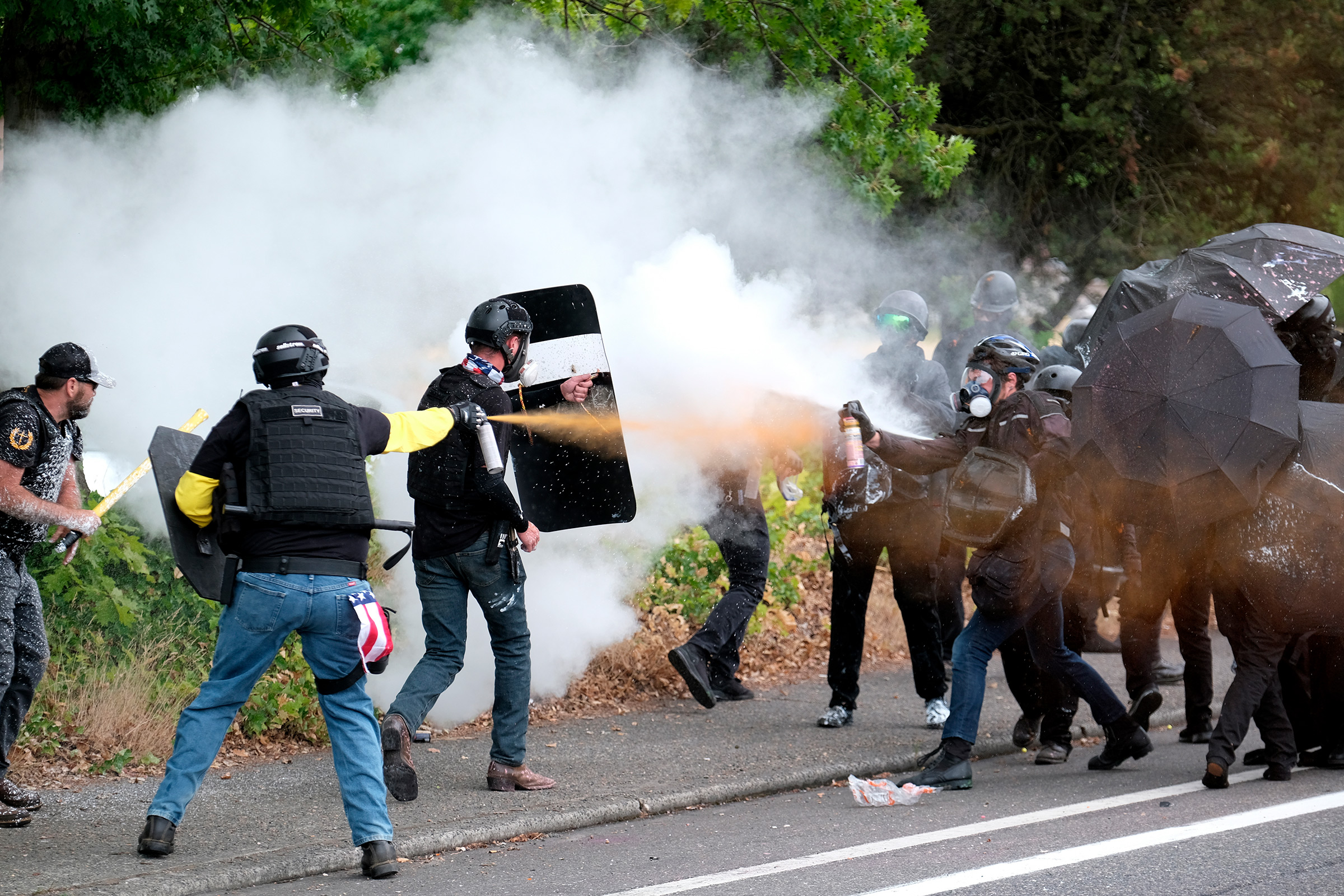Hours after the angry mob of pro-Trump rioters ransacked the U.S. Capitol on Jan. 6, 2021, a small contingent of men regrouped three blocks away at a nearby hotel. Members of the far-right paramilitary group known as the Oath Keepers, the men gathered in a private suite at the Phoenix Hotel in downtown D.C. and listened as their leader, Stewart Rhodes, dialed someone on speaker phone and said that President Donald Trump should call on the Oath Keepers to “forcibly oppose the transfer of power.” After he hung up, according to court documents, Rhodes turned to the group and declared, “I just want to fight.”
Eighteen months later, the Oath Keepers, the Proud Boys and other extremist groups involved in the violence on Jan. 6 are still spoiling for a fight. The July 12 hearing by the House committee investigating the Jan. 6 attack is expected to focus on the allegedly criminal activity by their members that day, including seditious conspiracy and obstruction, as they attempted to keep then-President Donald Trump in power. But evidence in hundreds of federal cases, hours of Congressional testimony and online posts among their members show that their efforts to overturn the 2020 election were just a small part of their larger ambitions.
Over the last year and a half, the groups have surfaced at protests against COVID-19 vaccines and other government public health measures at state capitals. They’ve disrupted school board and town council meetings to protest mask mandates. Recently, these groups have been more visible in public. On June 9, the same week the Jan. 6 committee held its first public hearing, a Proud Boys group stormed a “Drag Queen Story Hour” event at a local library in California, shouting slurs and “You’re not safe here.” Over the July 4 weekend, a group of men wearing Proud Boys emblems gathered at Independence Hall in Philadelphia, while about 100 people associated with the white supremacist Patriot Front group marched through Boston, carrying shields and flags with their insignia. Anti-government militias and extremist groups like the Proud Boys have appeared at 27 abortion-related events as of July 1, according to new data shared with TIME by the Armed Conflict Location & Event Data Project (ACLED), a nonprofit that tracks political violence. That amounts to a 160% spike over the previous year.
To hear some of their members tell it, the groups’ goal is not just to confront local opponents but also to undermine the U.S. government, which they see as having been “coopted by a cabal of elites actively trying to strip American citizens of their rights,” in the words of the indictment against one of the Oath Keepers involved on Jan. 6. “This all ends when we refuse to obey tyrants,” the Seattle Proud Boys chapter posted on Telegram last December, one of more than a dozen local groups that have grown in membership since Jan. 6, 2021.
Just how far extremists will go as political tensions mount has law enforcement worried. With political violence on the rise, the Department of Homeland Security warned in a recent terror alert that domestic extremists seek to seize on the upcoming midterm elections. “The threat [from these groups] is not greater or lesser, but different and evolving, and arguably more complex,” says Elizabeth Neumann, who led the Department of Homeland Security office that oversees responses to violent extremism from 2018 to 2020.
Read More: With All Eyes on Washington, the Real Far-Right Threat Has Moved On
Part of the challenge is untangling allegedly criminal behavior from constitutionally protected rights of assembly and free speech. Eleven members of the Oath Keepers have been charged with seditious conspiracy for their actions on Jan. 6, and five members of the Proud Boys are also facing the rare charge of conspiring to overthrow the government and prevent the execution of law. While several members of both groups have pleaded guilty, Rhodes and Proud Boys leader Enrique Tarrio, who have both been charged with seditious conspiracy, have not.
Even harder for law enforcement to manage may be the risk of fueling a quasi-revolutionary cause by stoking the extremist narrative of “political persecution.” The groups have continued to organize online, enlisting members from coast-to-coast. Leaked membership rosters show dozens of elected officials and members of law enforcement and the military among their ranks. Even as they try to avoid legal jeopardy, the groups are using the law enforcement crackdown as a rallying tool. “Everyone they want to vilify is labeled a Proud Boy,” the group’s official Telegram channel said in a post about the Jan. 6 hearings. “Don’t ever forget what these blood-soaked monsters have done to you. They hate your f–g guts.”

“The last line of defense against tyranny”
The anti-government Oath Keepers were formed in 2009, one of the many self-styled militias to pop up after the election of President Barack Obama. It was founded by Rhodes, a 57-year-old former Army paratrooper and Yale Law School graduate. He focused on recruiting current and former military, law enforcement and first-responders, and members were encouraged to see themselves as “the last line of defense against tyranny,” according to Oath Keepers websites. A roster of 38,000 members of the group leaked last fall showed police officers, sheriffs and elected officials in their ranks. Many of those present at the Jan. 6 riot had similar backgrounds. Rhodes himself was photographed at the Capitol that day.
The Proud Boys were formed around the 2016 presidential election as self-described “Western chauvinists” who denounce American “political correctness” and “white guilt.” The group is made up of a loose-knit collection of chapters and local leaders throughout the country. Wearing their distinctive black polos with yellow stripes, members often provided “security” at Republican party events the last two election cycles.
Read More: Inside One Combat Vet’s Journey From Defending His Country to Storming the Capitol
Jan. 6 prosecutors allege the Oath Keepers and Proud Boys organized, equipped and trained ahead of time, and coordinated their actions on the day of the breach using hand signs, cell phones, walkie-talkie-like apps and encrypted chat programs like Signal, MeWe and Zello to move around the Capitol. Many members were caught on camera wearing tactical vests, helmets and radios, as they forcibly entered through the rotunda doors. Nick Quested, a British documentary filmmaker who was embedded with the Proud Boys during the insurrection, testified before the Jan. 6 committee that members of the group scouted security around the Capitol before attacking hours later.
Defense attorney Nayib Hassan says in court filings that his client Tarrio never told anyone to enter the Capitol or to engage in any violence on Jan. 6. A garage meeting between Tarrio and Rhodes that was filmed by Quested was more or less meaningless, Hassan says. Oath Keeper defendants have argued in court that they only ever intended to provide security at the rally. Both groups have cast themselves as victims of political persecution, a message that has resonated in many parts of the country, with millions of dollars being raised for their legal defense on crowdfunding sites.
The trial for Rhodes and four other Oath Keepers members and associates is scheduled to start on Sept. 26. Tarrio and four other Proud Boys face a trial slated to begin on Dec. 12. The conspiracy charges the two men and others face carry a penalty of up to 20 years in prison. In the past 17 months, more than 860 people have been charged with various crimes for attempting to interfere with Congress’ certification of Joe Biden’s victory in the 2020 presidential election. At least 306 people have pleaded guilty in connection to the insurrection, which ultimately left five people dead, and scores wounded.

“A broad range of grievances”
The crackdown has cut both ways. Far-right extremist groups were initially emboldened by the perceived success of Jan. 6, but as law enforcement began charging participants, the groups became wary, says Neumann. “Law enforcement investigations caused many of the more organized groups to lay low,” she says, “Even if they’re not being investigated, they’re paranoid that they’re being monitored.”
The increased scrutiny, by federal and local law enforcement as well as the public, has forced the Oath Keepers and Proud Boys to find new ways to adapt in order to get their message out. As social media companies have cracked down on the spread of extremist content, these groups have scattered across alternative, often-encrypted communication platforms. Through WhatsApp and Telegram channels, the Oath Keepers and Proud Boys continue to strategize, spread messaging and plan for protests.
The shift has tested the ability of the groups to adapt. “De-platforming, off of major tech platforms, largely worked,” Neumann says. “The older generation—which made up a larger portion of the Jan. 6 crowd than traditional violent extremist movements do—have difficulty working on smaller, less sophisticated platforms. Younger generations with tech-savvy are able to operate on smaller platforms but have difficulty recruiting via these mechanisms.”
And after the initial wave of arrests and media attention prompted caution, the extremist organizations have returned to the business of fighting what they say is the destruction of the country by what they see as tyrannical forces within the U.S. government, says Jason Blazakis, a former counter-terrorism official at the U.S. State Department, who is now a professor at the Middlebury Institute in Monterey, Calif. “The groups involved have always been motivated by a broad range of grievances that go beyond Trump,” he says. “The 2020 election results and Trump-defeat certainly factors in and still does, but these groups have been driven by 2nd Amendment conspiracy theories, notions of a great replacement, amongst many other things.”
Over the past 18 months, some members of these groups have used their notoriety to draw attention to anti-vaccine protests, political rallies and in support of gun rights initiatives. A group of men wearing the insignia of the Proud Boys took part at a large anti-vaccine march in Washington in January. That same month, a Florida man was arrested with a homemade explosive after attending an Oath Keepers’ rally that was held in a courthouse parking lot. In May, about two dozen Proud Boys marched down Long Island streets for the second time this year handing out fliers. Last August, gunfire erupted in Portland Ore. after a standoff between far-right agitators, including Proud Boys members, and anti-fascist protestors.
Read More: Armed Demonstrators and Far-Right Groups Are Escalating Tensions at Abortion Protests
Some far-right extremist groups have organized around the narrative that those charged for their participation on Jan. 6 are “political prisoners” of a tyrannical federal government. This led to demonstrations in 18 states and Washington, D.C., with the Proud Boys appearing at 40% of them, according to an analysis by the Bridging Divides Initiative, a nonpartisan research group that tracks political violence. These “Justice for J6” rallies were also attended by members of the Oath Keepers, other anti-government militias like the Three Percenters and Texas militia, and far-right groups like the Groypers and White Lives Matter.
While many members of militias like the Oath Keepers went underground amid intense public and law enforcement scrutiny, that does not mean they have not been organizing, experts say. “The perceived illegitimacy of the Biden administration among the Oath Keepers is likely to increase the organization’s so-called ‘will to fight’ government forces—especially if they perceive an attempt at weapons confiscation,” a report by the Armed Conflict Location and Event Data Project, a nonprofit that monitors violence, said last year, noting that this will “further ingratiate the Oath Keepers to anti-government recruits.” Some groups have continued to identify Democratic members of Congress as “domestic enemies” and pushed the belief that the U.S. is facing civil war.
U.S. national security agencies, including the FBI and DHS, have consistently flagged anti-government groups and militias as an ongoing threat. The groups also figured in the Biden Administration’s strategy to combat domestic extremism, which was issued by the National Security Council last summer. A “key component of the threat comes from anti–government or anti–authority violent extremists,” it says. “This includes self–proclaimed ‘militias’ and violent extremists who take steps to violently resist government authority or facilitate the overthrow of the U.S. Government based on perceived overreach [and] sovereign citizen violent extremists, who believe they are immune from government authority and laws.”

“Has to be local. No other way.”
Some members of these groups have signaled that they’re shifting to local politics, seeking to build support from the ground level. “I’ve always said my goal for this year… was simple,” Tarrio told NPR last summer. “Start getting more involved in local politics, running our guys for office from local seats, whether it’s a simple GOP seat or a city council seat.” Some members of these groups have already attempted to do so, including a member of the Oath Keepers who was at the Capitol on Jan. 6 and ran for the New Jersey State Assembly.
Far from considering it damning, supporters of these groups are boasting about the violent footage of their involvement on Jan. 6. “Hearing the Swamp Congress blaming Proud Boys for 1/6 makes me so proud of them,” one person posted on a popular pro-Trump online forum during the hearings. “The Proud Boys are real men, that’s why our authoritarian government will lie and makeup evidence against them,” another person agreed. Others in these online communities saw it as a call to action. “You should be uniting with people you work with or go to church with,” one user wrote. “Has to be local. No other way. And if local works, works real well, we link up with other locals.”
Support for these views may not be limited to the fringe. Several recent polls show a significant spike in the number of Americans who believe violence against the government is justified, from 10% in the 1990s to 38% in a Washington Post-University of Maryland poll conducted earlier this year. Now, about one in three Americans say they believe violence against the government can at times be justified, with a sharper increase on the right: 40% of Republicans versus 23% of Democrats.
National security agencies say they have monitored similarly troubling trends. A terror bulletin issued by the Department of Homeland Security on June 7 described a bleak, overlapping patchwork of extremist threats, from copycat attackers inspired by the white supremacist mass shooting in Buffalo to possible violence around the Supreme Court decision on abortion rights. “As the United States enters mid-term election season this year, we assess that calls for violence by domestic violent extremists directed at democratic institutions, political candidates, party offices, election events, and election workers will likely increase,” the DHS bulletin warns.
More Must-Reads from TIME
- Donald Trump Is TIME's 2024 Person of the Year
- Why We Chose Trump as Person of the Year
- Is Intermittent Fasting Good or Bad for You?
- The 100 Must-Read Books of 2024
- The 20 Best Christmas TV Episodes
- Column: If Optimism Feels Ridiculous Now, Try Hope
- The Future of Climate Action Is Trade Policy
- Merle Bombardieri Is Helping People Make the Baby Decision
Write to W.J. Hennigan at william.hennigan@time.com and Vera Bergengruen at vera.bergengruen@time.com
